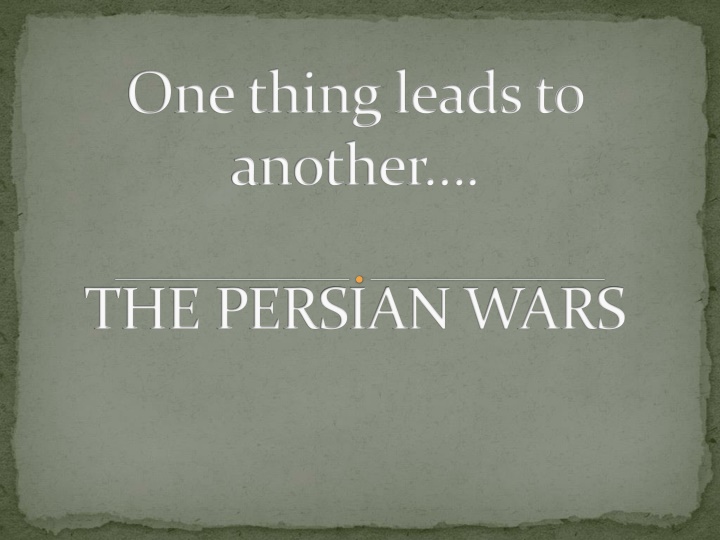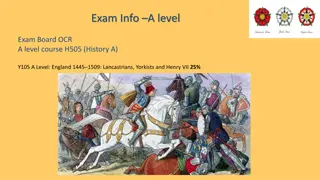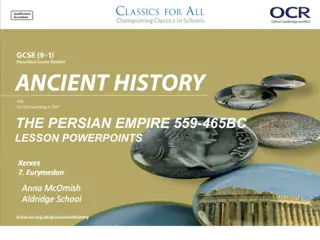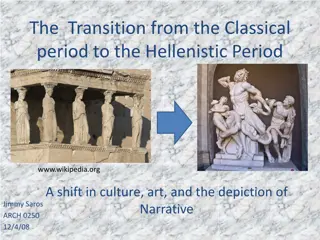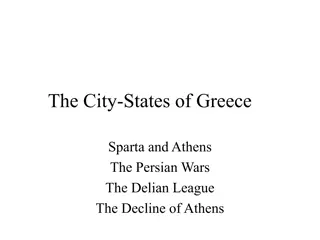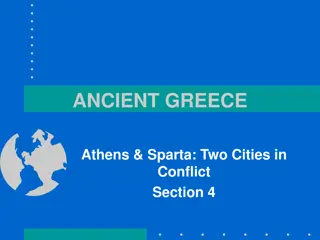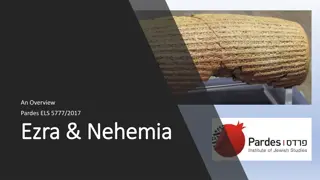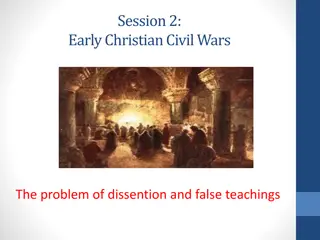The Persian Wars - One Thing Leads to Another
The Persian Wars were a series of conflicts triggered by events like the Ionian Revolt, leading to the Persian Empire seeking revenge on Athens. Starting with small fleets and culminating in the Battle of Marathon, the Greeks, though initially the underdogs, managed to repel the Persians. The Athenians used newfound silver mines to boost their navy, expanding it significantly. Xerxes, son of Darius I, then sought to conquer all of Greece, prompting a united Greek front against Persia.
Download Presentation

Please find below an Image/Link to download the presentation.
The content on the website is provided AS IS for your information and personal use only. It may not be sold, licensed, or shared on other websites without obtaining consent from the author.If you encounter any issues during the download, it is possible that the publisher has removed the file from their server.
You are allowed to download the files provided on this website for personal or commercial use, subject to the condition that they are used lawfully. All files are the property of their respective owners.
The content on the website is provided AS IS for your information and personal use only. It may not be sold, licensed, or shared on other websites without obtaining consent from the author.
E N D
Presentation Transcript
One thing leads to another . THE PERSIAN WARS
https://www.youtube.com/watch?v=HdNn5TZu6R8 (from 0:41 to 2:20)
Causes of Persian War? Ionian Revolt gets Athenians involved in Persian Empire s affairs Persia doesn t forget this Want Revenge
Persia Turns to Athens Darius I (king of Persia)- decides to start small in his revenge plan Sends small fleet, which is able to move easily through the weaker city states in Northern Greece Persians gain confidence from this send larger fleet Athenians prepare for Persian invasion Make bold move to abandon Athens and fight at Marathon instead
Battle of Marathon Greeks are the Underdog- have to rely on good fighting skills, good armor, and good strategy Outlast the Persians, who lost about 6,000 men Athenians lose only about 200 TURNING POINT After this, Persians need to regroup and come up with new strategy Go home Are they done just yet?
Interlude After the Persian retreat Athenians discover several silver mines and decide to use that newfound wealth to boost the strength and size of their navy Between 489 BCE and 480 BCE Athens expands its fleet to 220 triremes (the latest in warship technology) What s a trireme? Triple decker warship- took about 170 oarsmen 31 on top level, 27 on middle level, 27 on lower level https://www.youtube.com/watch?v=PCAV33AIbU8
Xerxes wants Greece Darius I, in the middle of plotting revenge, dies His son, Xerxes, takes over Xerxes = ambitious wants ALL of Greece Athenians know they cant defeat Xerxes on their own Meet up with 31 other Greek city-states, who join in the fight against Persia Why is this a big deal?
300 Newly formed Greek Army wants to meet Persians at Thermopylae Traitor ruins the battle strategy Spartans decide to fight off the Persians, giving Greek army a chance to retreat
Battle of Salamis Persians closing in on Athens Athenians evacuate and leave city defenseless Take to the Seas- this is where the Greeks strength is Corner the Persian fleet, win big TURNING POINT- tips the scales in the other direction
Effects Greeks gain a sense of intense confidence- after all, they, the underdogs, had defeated the Mighty Persian Empire! Athens in particular gets glory Contribution at Marathon and Salamis Formation of Delian League- city- states band together Unified force to protect one another Alliance system Worked to recover financial losses Athens becomes de-facto leader
Effects of Persian Wars Athens gains confidence- they emerge as strongest city-state Political Explosion= Desire to strengthen government Desire to strengthen navy Becomes unofficial Leader of Delian League Cultural Explosion= Glorify Athens Cultural and political dominance= GOLDEN AGE
Since the Athenians and other Greeks could not assume that the Persians would not come back, they decided the best defense was a good offense, and formed an alliance known as the Delian League. 2. What role did the Persian wars play in undermining the democracy at Athens?
